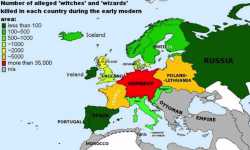[84 / 48 / ?]

108KiB, 1200x722, gorgotten-innocents-witch-hunts-past-and-present.jpg
Quoted By: >>20135546 >>20135548 >>20135549 >>20135552 >>20135553 >>20135554 >>20135555 >>20135556 >>20135562 >>20135567 >>20135568 >>20135571 >>20135572 >>20135575 >>20135585 >>20135613
Witch Hunting happened between 1400-1800 starting at the end of the Middle Ages and the beginning of the Modern Age in the West Alpine area (Switzerland, South East of France, Northwest Italy), which at the time were part of the Germanic Holy Roman Empire AKA First Reich. The greatest geo-historical-political events of these times were the Fall of Constantinople (Byzantium/Eastern Roman Empire), Renaissance, Invention of the Printing Press, Scientific Revolution, Protestant Reformation and Wars of Religion, Great Navigations and Colonialism, rise of Absolutism and Enlightenment.
The stuff that matters here is the Renaissance, specifically the German/Northern Renaissance in the occult aspect, but before talking about that, I want to contextualize the Italian Renaissance from which it was based: Marsilio Ficino, apprentice of the Neo-Platonic Byzantine scholar Gemistos Plethon, was responsible for translating the Corpus Hermeticum, the main texts of Hermetica literature, at the request of Cosimo de' Medici, a member of the powerful Italian royal banker family, House of Medici, that had several popes. Marsilio Ficino's apprentice was Giovanni Pico della Mirandola, he mixed the Corpus Hermeticum with the Jewish Qabbalah, thus creating the "Christian Cabala", which would serve as the main philosophy of secret societies such as the Rosicrucians, Freemasonry, etc... more later.
Before that, they influenced German occultists such as Johannes Trithemius, Johannes Reuchlin, Johann Weyer, Heinrich Cornelius Agrippa, Theophrastus Bombastus von Hohenheim Paracelsus, etc... But the most important of them on this occasion is Johann Georg Faust, whose mysterious stories of pact with the demon Mephostophiles, night flights and the magical invocation of spirits, added to his mysterious death, made him the model of a black magician.
The stuff that matters here is the Renaissance, specifically the German/Northern Renaissance in the occult aspect, but before talking about that, I want to contextualize the Italian Renaissance from which it was based: Marsilio Ficino, apprentice of the Neo-Platonic Byzantine scholar Gemistos Plethon, was responsible for translating the Corpus Hermeticum, the main texts of Hermetica literature, at the request of Cosimo de' Medici, a member of the powerful Italian royal banker family, House of Medici, that had several popes. Marsilio Ficino's apprentice was Giovanni Pico della Mirandola, he mixed the Corpus Hermeticum with the Jewish Qabbalah, thus creating the "Christian Cabala", which would serve as the main philosophy of secret societies such as the Rosicrucians, Freemasonry, etc... more later.
Before that, they influenced German occultists such as Johannes Trithemius, Johannes Reuchlin, Johann Weyer, Heinrich Cornelius Agrippa, Theophrastus Bombastus von Hohenheim Paracelsus, etc... But the most important of them on this occasion is Johann Georg Faust, whose mysterious stories of pact with the demon Mephostophiles, night flights and the magical invocation of spirits, added to his mysterious death, made him the model of a black magician.
